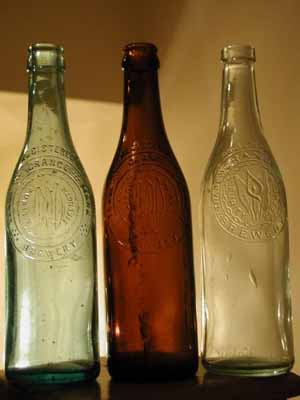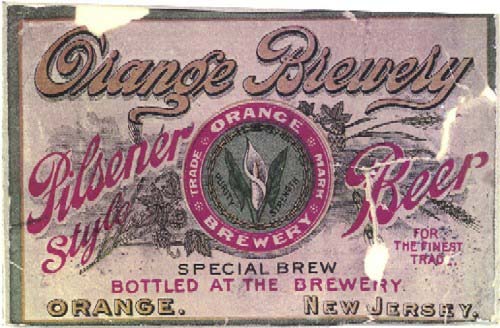The Orange Brewery - Bottles & Labels
The Orange Bottles 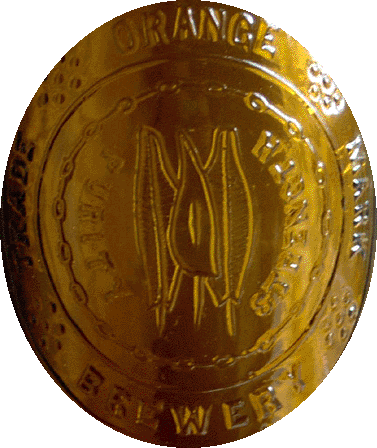 |
"There goes a live wire -" that was early 1900 slang for "The drinks are on the Orange Beer Collector."
When the Winter family first opened Orange Beer - today known as Rheingold Breweries - it operated a localized draft beer business which sold to local taverns.
Every so often, the salesmen from the old Orange Brewery would hit the tavern trail to "polish the mahohany" (wich means make good on the bills), frequently only to end up treating the bartenders' patrons to a round of drinks. There's a story that the old collector was something of a pied piper, for at his heels were always a group of men out of work, following him to the tune of free drinks.
Nowadays, by state law, breweries and taverns operate independently, so that the licence is no longer controlled by the supplier.
The Winter family had chosen Rheingold Breweries' present site, on the corner of what is now Hickory Streeet and Route 280, because the Artesian wells in the area afforded excellent water for brewing. The old Pennsylvania family opened Orange Beer in 1901 and set up private residence on So. Center Street where St. Mary's Hospital now stands.
The beer label of Orange Brewery. |
The beer, which the families made themselves, was bottled and in addition to being sold to the local taverns, was delivered to homes.
Then came Prohibition, and in 1917, the beer company was closed down. During the dry years, several businesses, including a laundry, occupied the old beer plant.
But one of President Franklin Delano Roosevelt's pledges during the 1922 election was that he would bring back the beer, and in April 1933, he kept his promise.
It was in 1934 that John F. Trommer Breweries, Inc. bought the Orange plant. The family, which already owned a beer plant in Brooklyn, put several years and a lot of money into shaping up the new Orange branch, enlarging the bottle shop and installing new bottle lines.
When, in January, 1950, the Trommers sold out to Piels' company, the Liebmann family look over the Orange brewery, turning out Rheingold extra dry beer until 1964.
That year, the Pepsi Cola United Bottling Corporation purchased the plant and one year later, changed the name to Rheingold Breweries, Inc.
The company stayed in the same hands for approximately ten years, after which the Pepsi Cola Company proper ran it. But Pepsi, beeing sold on soda, didn't have all that much interest in beer. When they closed down the Brooklyn beer plant, it soon became apparent that their intend was to acquire Rheingold's franchises for their own product.
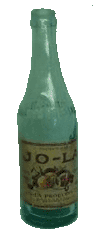 Bottle ... |
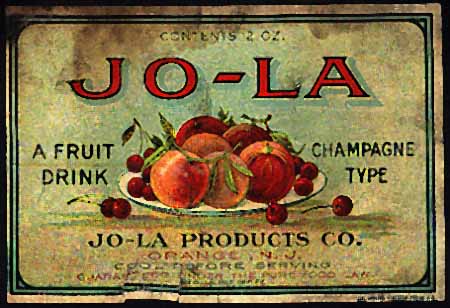 ... and label of the Jo-La Cola lemonade |
Meanwhile, William Black, chairman of the Board at Chock Full 'o Nuts, had his eye on Rheingold, and in April, 1973, that company took over.
The can, and the 32- and 16-ounce bottle, are today's variations on the original 12-ounce neck bottle that was once carted to taverns by horse and wagon.
Beer is still brewed the old-fashioned way, however - with barley that's been malted, doubly fermented and naturally carbonated. And nothing but barley, malt, hops, and corn go into the making of the beer - that's been the Rheingold extra dry formula since the company came into being.
In 1975, any oldtimer driving past the well-known Orange site - where former Commissioners John Codrun and Harry Winters once worked - will find new warehousing and loading facilities on the Hirkery Street side and parking space for the Rheingold trucks on Hill Street. Inside, additional bottling lines have been installed on the second floor.
In recent years, Rheingold and Orange have worked hand in hand to foster pride in the community - Rheingold girls were out for the parade in 1956, on the occasion of Orange's 150th anniversary. And those who remember last May's first Orange Day celebration are familiar with the Rheingold promotional posters.
